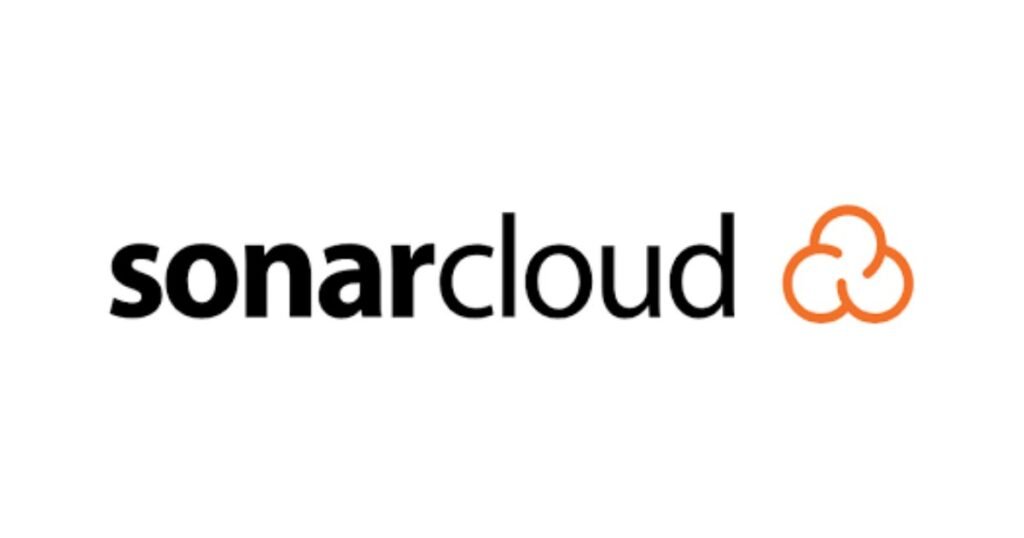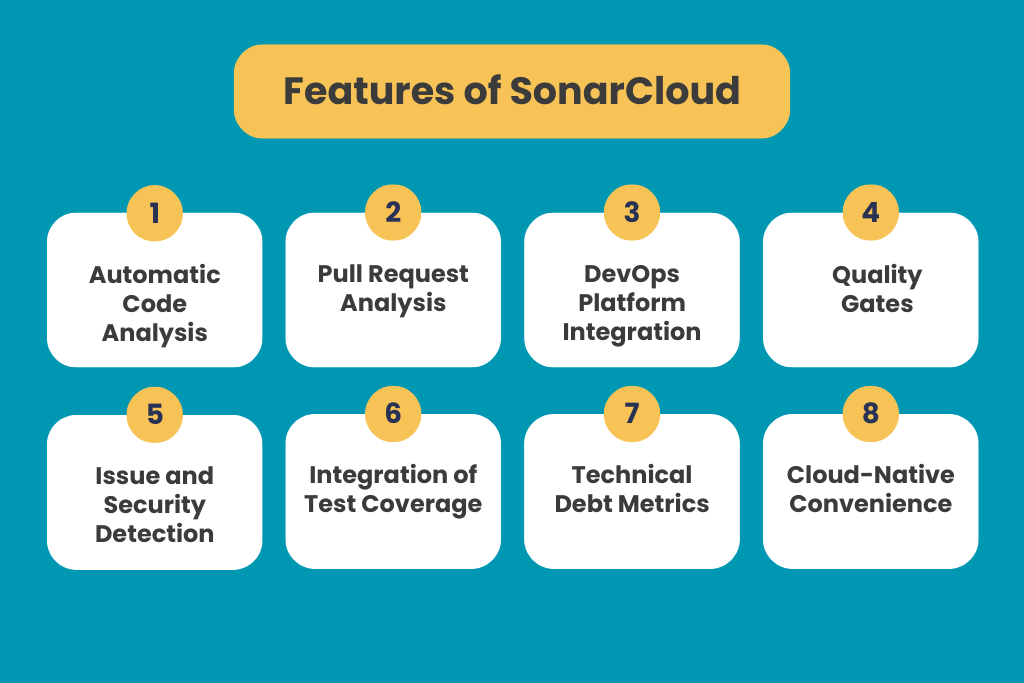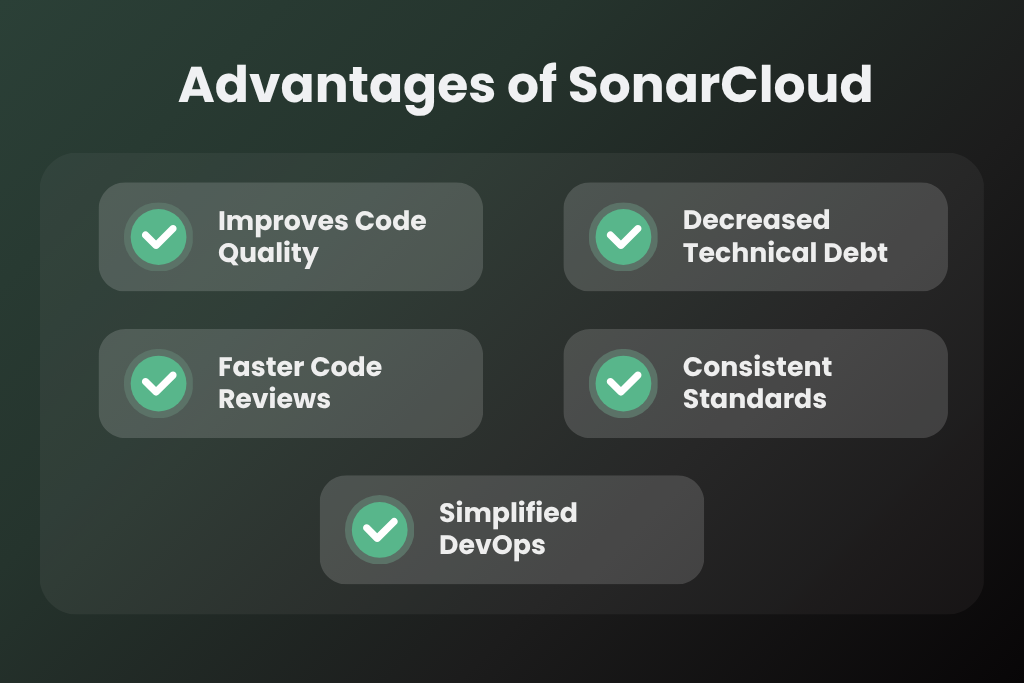SonarCloud Explained: Key Features, Benefits, and How It Works
Optimize code health with DevTools SonarCloud support — detect vulnerabilities, enforce standards, and accelerate delivery with confidence. Schedule your free consultation today!
14 +
Years of Experience
550 +
Happy Customers
250 +
Years of Tech Leadership Exp.

"License Reseller" and "Consulting & Implementation" Partner

TL;DR
- SonarCloud is a fully managed SaaS platform that performs automated static analysis to detect bugs, vulnerabilities, and code smells across 30+ languages.
- It integrates seamlessly with GitHub, GitLab, Bitbucket, and Azure DevOps to enforce quality gates and deliver feedback directly in pull requests.
- Teams benefit from improved code quality, reduced technical debt, faster reviews, consistent standards, and streamlined CI/CD workflows.
- Partners like DevTools assist organizations with planning, deployment, customization, training, and ongoing optimization of SonarCloud and SonarQube.
SonarCloud is a cloud-based code quality and security tool from SonarSource that helps developers detect bugs, vulnerabilities, and code smells directly within their DevOps workflow. Designed as a fully managed SaaS solution, SonarCloud runs automated static code analysis on every commit and pull request, ensuring your code meets clean code standards before merging. With seamless integrations into GitHub, GitLab, Bitbucket, and Azure DevOps, SonarCloud empowers teams to deliver secure, maintainable, and reliable software faster — without slowing down CI/CD pipelines.
What is SonarCloud?
SonarCloud is a cloud-based code quality and security platform from SonarSource that performs automated static code analysis on every commit and pull request. It helps developers detect bugs, vulnerabilities, code smells, and maintainability issues early in the development lifecycle — before they reach production.
Unlike self-hosted SonarQube, SonarCloud is delivered as a fully managed SaaS solution, requiring no infrastructure or upgrades. It supports 30+ programming languages (including Java, Python, C#, TypeScript, and infrastructure-as-code), making it ideal for modern, polyglot DevOps environments.
By integrating directly with GitHub, GitLab, Bitbucket, and Azure DevOps, SonarCloud automatically enforces quality gates on pull requests and merges. This ensures that only secure, maintainable, and clean code progresses through your CI/CD pipeline.
Features of SonarCloud

SonarCloud provides a powerful set of features designed to improve code reviews, enforce clean code practices, and secure applications across the DevOps lifecycle:
1. Automatic Code Analysis
SonarCloud requires no extra configuration for most languages to begin analyzing code right away. As soon as you connect a repository, it performs an automatic scan and delivers immediate results. With support for more than 30 programming languages—including Java, JavaScript, TypeScript, Python, C#, C/C++, PHP, Kotlin, Go, and many more—it provides complete coverage for your entire codebase in one tool.
2. Pull Request Analysis (PR Decorators)
To improve pull request workflows, SonarCloud integrates natively with GitHub, Bitbucket, GitLab, and Azure Repos. It automatically performs static analysis on every pull request and provides feedback directly within the PR. This ensures that developers can identify and fix problems early, before changes are merged into the main branch.
3. DevOps Platform Integration
With SonarCloud, importing projects takes just minutes thanks to one-click integration with leading DevOps platforms. Whether you use GitHub Actions, Azure Pipelines, Bitbucket Pipelines, or GitLab CI, analysis is seamlessly embedded into your build and release process, keeping quality checks continuous without slowing down development.
4. Quality Gates
SonarCloud enables teams to define “go/no-go” quality gates to enforce coding standards. If the code fails to meet these rules—such as too many bugs or insufficient test coverage—the pipeline will fail automatically. This prevents poor-quality code from being merged or deployed, ensuring consistent quality across projects.
5. Issue and Security Detection
SonarCloud’s powerful analysis engine detects bugs, code smells, and vulnerabilities across your projects. It also includes SAST rules and security hotspots to uncover potential weaknesses in both developer-written and AI-generated code. Issues are grouped by type and severity, making it easy for teams to assign fixes and track progress through a collaborative dashboard.
6. Integration of Test Coverage
By importing code coverage reports from tools like JaCoCo, Istanbul, and others, SonarCloud identifies untested areas of your codebase. This allows teams to see exactly which sections lack unit tests, helping improve coverage and reduce the risk of defects slipping into production.
7. Technical Debt Metrics
SonarCloud provides detailed insights into technical debt, estimating the amount of work required to fix accumulated issues. By showing where debt is building up, it helps teams prioritize refactoring tasks and maintain a healthy, sustainable codebase over time.
8. Cloud-Native Convenience
Because it is a fully managed SaaS solution, SonarCloud requires no infrastructure or server maintenance. It is always current, automatically scales to your needs, and SonarSource ensures all upgrades and uptime. This gives teams the freedom to focus on development while relying on a secure, hassle-free service.
Advantages of SonarCloud

There are numerous tangible advantages to using SonarCloud in your development process:
Improved Code Quality
SonarCloud delivers enhanced software quality by identifying bugs, security vulnerabilities, and code smells early. Teams that receive ongoing feedback can address problems promptly, producing code that is cleaner and easier to maintain.
Decreased Technical Debt
SonarCloud reveals poor coding habits and accumulated debt. Teams are able to recognize and manage technical debt before it becomes unmanageable. Over time, this results in stronger, less brittle code.
Faster Code Reviews
Developers can reduce manual inspections by automating static analysis. Reviewers receive a prioritized list of issues rather than going through the code line by line. This allows teams to save significant time and concentrate on building new features.
Consistent Standards
All team members view the same metrics thanks to a shared quality dashboard. SonarCloud ensures that security guidelines and coding standards are applied consistently across projects. This shared visibility promotes a common understanding of quality metrics.
Simplified DevOps
SonarCloud integrates seamlessly with your CI/CD pipeline through native integration. Builds are not slowed down, and code quality is continuously monitored. Because routine checks are automated, teams can redirect efforts toward innovation.
All things considered, SonarCloud allows teams to see and manage the health of their code. When implemented in real-world scenarios, companies report quicker releases and fewer bugs after deployment. It ensures that DevOps teams consistently follow clean-code guidelines.
How Does SonarCloud Operate?
SonarCloud operates by blending in perfectly with your current development process. A typical workflow is as follows: the CI pipeline initiates a SonarCloud scan after a developer pushes or creates a pull request in GitHub, Bitbucket, or GitLab.
The source code is sent to SonarCloud by the SonarQube Scanner, a tool that runs during your build. SonarCloud then completes its analysis, checking for errors, security flaws, duplicates, coverage gaps, and more, before posting the findings to your SonarCloud dashboard. For quick triage, any issues or failures of the quality gate are immediately fed back into the pull request.
In a typical CI/CD pipeline, developers push code, a CI build runs the SonarQube Scanner, SonarCloud analyzes the code, flags problems, and displays the feedback directly in the pull request.
During this process, SonarCloud also collects and measures metrics, keeping track of historical data so you can monitor quality trends over time. Because SonarCloud is always online, analyses are completed in just a few minutes, and the code health dashboard remains accessible to anyone with the right permissions. With this “clean as you code” approach, your codebase continuously improves and stays protected from new issues with each merge.
How to Begin Using SonarCloud

SonarCloud is easy to get started with:
Register
Visit sonarcloud.io and sign in with your Azure DevOps, Bitbucket, GitLab, or GitHub credentials. SonarCloud is thus linked to the projects associated with that account.
Establish an Organization
Select a plan and, if necessary, establish a new organization in SonarCloud. For individuals and small teams, there is a free plan (see below).
Include a Project
Choose or import a repository for analysis. Public projects can be automatically scanned by SonarCloud, or you can grant it access to your private repository.
Set Up Your Build
SonarCloud will provide you with some setup guidelines. Usually, your CI pipeline or YAML file needs to include a project key and token (an environment variable like SONAR_TOKEN). For tools like Gradle, Maven, or SonarScanner CLI, SonarCloud offers a pre-made CI snippet or Scanner command. For instance, you add a Sonarcloud_check job in GitLab using your SONAR_HOST_URL and SONAR_TOKEN variables along with the SonarScanner image.
Conduct an Analysis
Either start a build or commit and push your code. The results of the SonarScanner will be run and uploaded. View the quality report on your SonarCloud dashboard in a matter of minutes.
Review Results
SonarCloud will categorize issues. Establish a quality gate, such as “no new blocker bugs.” Developers will now see SonarCloud’s comments or status checks enforcing those gates on every pull request.
Example Workflow
To illustrate the setup, you can add a Sonar analysis step to your CI script after logging in and creating an organization. By setting your repository’s SONAR_HOST_URL (typically https://sonarcloud.io) and SONAR_TOKEN as CI variables, each push is analyzed automatically—making the process largely hands-free.
Free and Paid Plans
SonarCloud’s free tier permits an unlimited number of open-source projects and up to 50,000 lines of code in private projects. For the majority of small to medium-sized projects, this is typically sufficient. Paid plans offer additional users, languages, or enterprise features for larger teams. However, a lot of teams begin with the free plan and upgrade as necessary.
Why SonarCloud Is Valuable?
SonarCloud is a straightforward cloud-based solution that gives every team access to enterprise-grade code analysis. It enforces coding standards, detects errors and vulnerabilities early, and seamlessly integrates with your DevOps process. Cleaner, safer code and a more efficient development process are the outcomes.
SonarCloud’s automatic analysis and quality gates ensure that only high-quality code advances. Whether you are working on an open-source project or a commercial codebase, SonarCloud enables developers to write clean code and continuously improve software quality as part of their CI/CD pipeline.
How DevTools Can Help with SonarSource Implementation
It can occasionally be difficult to integrate a strong code quality platform like SonarCloud or SonarQube throughout an organization, particularly when dealing with big codebases or intricate CI/CD pipelines. DevTools and other knowledgeable partners are useful in this situation. As a Gold Partner of SonarSource, the company that created SonarQube and SonarCloud, DevTools is a SonarSource Gold partner. By achieving Gold Partner status with SonarSource, the market leader in code quality and security solutions, DevTools has actually improved its DevSecOps offerings.
DevTools, a SonarSource partner, can help businesses deploy SonarCloud or SonarQube from start to finish:
Planning and Consultation
By learning about your projects, workflows, and objectives, DevTools can assist you in deciding which SonarSource product best suits your requirements (SonarCloud vs. SonarQube, Community vs. Enterprise editions, etc.). They will offer best practices for establishing quality gates, regulations, and metrics that complement your company’s goals.
Deployment and Integration
DevTools can assist with the installation, configuration, and scaling of SonarQube (self-hosted), including the setup of SonarQube in databases, enterprise environments, and other settings. They help you properly integrate SonarCloud with your CI pipelines and source repositories. This entails setting up pull request decoration and configuring build pipelines (Jenkins, Azure DevOps, GitHub Actions) to incorporate Sonar scans. In essence, they guarantee a smooth and frictionless integration of the tool into your DevOps workflow.
Customization
Every team has unique standards for code quality. DevTools specialists tailor quality gates and rule sets to match your coding standards and risk tolerance. For instance, a finance software team may request stricter security rules, and DevTools can configure Sonar to enforce them. They also provide guidance on handling false positives and fine-tuning analysis for the most accurate results.
Training & Best Practices
Successful adoption requires developer involvement. DevTools provides workshops and training sessions for developers and DevOps engineers, covering how to use SonarLint, interpret Sonar reports, and resolve issues efficiently. This training ensures your organization truly embraces a “quality code” culture and follows clean code practices.
Ongoing Support and Optimization
After initial setup, DevTools can offer support services to troubleshoot any issues that may come up, check the health of your SonarQube server (if self-hosted), and maintain your configuration optimized as your codebase develops. They can help you upgrade or modify your configuration to take advantage of new features (like new security rules or support for new languages) and stay up to date with the most recent SonarSource updates.
Integration with DevSecOps Toolchain
A lot of companies have a collection of DevSecOps tools, such as CI servers and issue trackers. Because of its expertise in the DevSecOps space, DevTools can assist in integrating Sonar’s outputs with other procedures. For example, it can assist in creating dashboards that integrate Sonar metrics with other project metrics or in feeding Sonar issues into JIRA tickets. This all-encompassing strategy guarantees that SonarCloud/SonarQube is a well-integrated component of your software delivery pipeline rather than a stand-alone tool.
Also Read: Best Practices to Integrate Security Into DevSecOps
DevTools supports you throughout the entire SonarCloud/SonarQube implementation journey. Their expertise helps avoid common pitfalls, saves time during setup, and accelerates adoption. By partnering with a SonarSource Gold Partner like DevTools, organizations can deploy Sonar solutions faster and start enjoying the benefits of cleaner, safer code right away.
FAQs
What is the purpose of SonarCloud?
SonarCloud is used to enforce quality and perform automatic source code analysis. It checks code for errors, security flaws, odors, and gaps in test coverage. By identifying problems in pull requests before they are released into production, developers utilize it to guarantee code security and quality as part of the development process.
Who uses SonarCloud?
SonarCloud is used by individual developers, software teams, and growing organisations across industries like technology, finance, retail, and healthcare. It supports teams that want automated code checks, clean code practices, and strong security built into their CI/CD pipelines. SonarCloud’s flexibility makes it suitable for small development teams as well as companies managing multiple projects who need continuous code quality and security oversight.
What distinguishes SonarCloud from SonarQube?
The same analysis engine is offered by SonarQube and SonarCloud; however, SonarQube is usually self-hosted (on-premises or in your own cloud), while SonarCloud is a fully-managed SaaS. SonarCloud only needs to be pointed at your repository; there is no setup or upkeep involved. As stated in the SonarSource documentation, “SonarCloud is now known as SonarQube Cloud.” In terms of functionality, SonarCloud offers the benefits of constant updates and simpler scalability, whereas SonarQube (server) provides greater control and options for on-site deployment.
What is the function of SonarQube?
The platform that does static code analysis is SonarQube, which can be used on-premises or in the cloud. It checks each pull request and your codebase against hundreds of coding rules. SonarQube (and SonarCloud), according to SonarSource, “deliver powerful static code analysis by thoroughly reviewing each pull request before it’s merged,” guaranteeing code quality and keeping problems out of the codebase. In essence, SonarQube assists teams in enforcing clean code practices by highlighting issues in code and measuring code quality metrics.
What are the benefits of SonarCloud?
SonarCloud provides instant, automated code analysis to help teams detect bugs, vulnerabilities, code smells, and test coverage gaps early in development. It integrates smoothly with GitHub, GitLab, Bitbucket, and Azure DevOps, enabling effortless code review within CI/CD pipelines. With features like secrets detection, multi-language support, and AI-assisted remediation, SonarCloud helps developers ship cleaner, more secure code with less manual effort. Its cloud-hosted model requires no setup or maintenance, making it easy for teams to adopt consistent coding standards across all projects.
Is SonarCloud a software as a service?
Indeed. SonarSource offers a Software-as-a-Service called SonarCloud. It is entirely cloud-managed. SonarCloud is a “SaaS solution for high-quality code,” according to Sonar’s own website. Easy, scalable, and quick. This implies that you use it online and don’t need to install it locally.
Does SonarCloud have no cost?
For small and open-source projects, SonarCloud provides a free plan. In particular, the free tier permits an unlimited number of public (open source) projects and the analysis of private projects up to 50K lines of code. SonarCloud offers paid subscriptions for teams that go beyond these restrictions or require more sophisticated features (such as additional users, languages, or enterprise support). However, a lot of users find that the free plan is enough to immediately begin enhancing code quality.

Pramodh Kumar M is a Solutions Architect at DevTools with over 6 years of specialized experience in DevSecOps and enterprise IT solutions. He holds multiple advanced certifications, including Certified Kubernetes Security Specialist (CKS), GitHub Advanced Security, and Azure Solutions Architect Expert. Pramodh specializes in Agile, Cloud & DevOps toolchain implementations, with extensive hands-on experience helping enterprises with digital transformation initiatives. His expertise extends to ServiceNow implementation and support. He is passionate about sharing practical insights on Cloud, DevOps, Automation, and modern IT operations.




